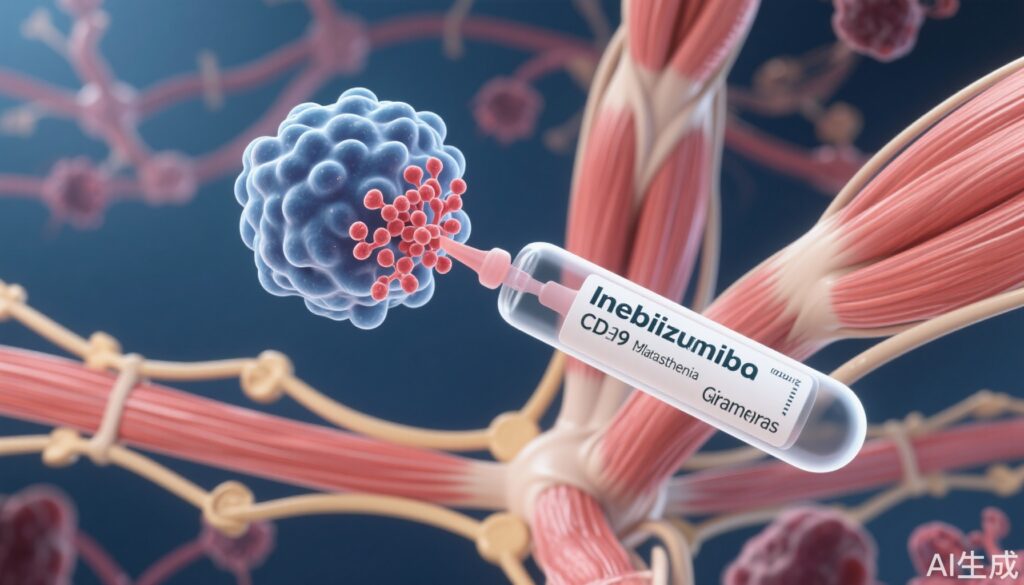Highlights
- Inebilizumab significantly improved functional outcomes and reduced disease severity in patients with generalized myasthenia gravis (gMG) who were positive for acetylcholine receptor (AChR) or muscle-specific kinase (MuSK) antibodies.
- The reduction in Myasthenia Gravis Activities of Daily Living (MG-ADL) and Quantitative Myasthenia Gravis (QMG) scores was clinically meaningful versus placebo at 26 weeks.
- Common adverse events included headache and nasopharyngitis; rates of serious adverse events were not increased with inebilizumab.
- This trial supports targeting CD19+ B cells as a novel therapeutic approach in antibody-mediated gMG.
Clinical Background and Disease Burden
Generalized myasthenia gravis (gMG) is an autoimmune neuromuscular disorder characterized by fluctuating skeletal muscle weakness and fatigue. Pathophysiologically, it is driven by autoantibodies, predominantly against the acetylcholine receptor (AChR) or, less commonly, muscle-specific kinase (MuSK), impairing neuromuscular transmission. Current treatments include corticosteroids, immunosuppressants, acetylcholinesterase inhibitors, and newer targeted therapies, but many patients experience inadequate disease control, relapses, or significant treatment side effects. There remains a substantial unmet need for more effective, targeted, and better-tolerated therapies, particularly for patients with refractory or moderate-to-severe disease.
Research Methodology
This phase 3, double-blind, randomized, placebo-controlled trial (MINT, NCT04524273) evaluated the efficacy and safety of inebilizumab—a humanized anti-CD19 monoclonal antibody—in adults with gMG who were positive for AChR or MuSK antibodies. Key inclusion criteria were a confirmed diagnosis of gMG and seropositivity for AChR or MuSK antibodies. Participants were randomized 1:1 to receive intravenous inebilizumab (300 mg on days 1 and 15 for all; an additional dose on day 183 for AChR-positive patients) or matching placebo. The treatment duration was 52 weeks for AChR-positive and 26 weeks for MuSK-positive patients. Concomitant glucocorticoids were tapered from week 4, targeting a maintenance dose of 5 mg/day by week 24.
The primary endpoint was the change from baseline in MG-ADL score at week 26 in the combined trial population. A key secondary endpoint was the change from baseline in QMG score at week 26. Safety and adverse events were systematically recorded.
Key Findings
A total of 238 participants (119 per group) were enrolled and randomized. The inebilizumab group experienced a significantly greater reduction in MG-ADL score at week 26 compared to placebo (least-squares mean change, −4.2 vs. −2.2; adjusted difference, −1.9; 95% confidence interval [CI], −2.9 to −1.0; P<0.001). Similarly, the QMG score improved more in the inebilizumab group (least-squares mean change, −4.8 vs. −2.3; adjusted difference, −2.5; 95% CI, −3.8 to −1.2; P<0.001). These outcomes represent clinically meaningful improvements in both daily functioning and quantitative muscle strength.
The most frequent adverse events with inebilizumab were headache, cough, nasopharyngitis, infusion-related reactions, and urinary tract infections. Importantly, the incidence of serious adverse events was not higher in the inebilizumab group compared to placebo, indicating a favorable safety profile over the study period.
Mechanistic Insights and Biological Plausibility
Inebilizumab targets CD19, a pan-B cell marker expressed from early B cell development through plasmablast and some plasma cell stages. By depleting CD19+ B cells, inebilizumab disrupts the production of pathogenic autoantibodies central to the pathogenesis of gMG. This mechanism is distinct from agents targeting only mature B cells (e.g., anti-CD20 therapies) and may offer broader immunomodulation, particularly relevant for antibody-driven diseases such as gMG. The observed clinical benefit aligns with reductions in B cell-mediated autoimmunity.
Expert Commentary
The results of this trial resonate with the growing body of evidence supporting B cell depletion strategies in antibody-mediated neurological diseases. Similar to the successful application of rituximab in MuSK-positive and some AChR-positive gMG patients, inebilizumab’s broader B cell targeting could expand therapeutic options. As noted by editorialists in the field, the magnitude of functional improvement (nearly 2-point greater reduction in MG-ADL) is both statistically and clinically meaningful, comparable to or exceeding other recently approved biologics for gMG.
Controversies and Limitations
While the study demonstrates robust efficacy and safety over 26–52 weeks, several limitations exist. The trial population was limited to seropositive gMG; generalizability to seronegative patients or pediatric populations remains uncertain. The duration, while sufficient for primary endpoints, does not address long-term efficacy, immunogenicity, or rare adverse events. The trial was funded by Amgen, the drug manufacturer, which may introduce bias, though the study design and reporting conform to rigorous standards.
Comparisons with other B cell depleting agents, such as rituximab or efgartigimod, were not performed directly, leaving open questions about relative efficacy, safety, and cost-effectiveness.
Conclusion
This phase 3 trial provides compelling evidence that inebilizumab, a CD19+ B cell depleting monoclonal antibody, significantly improves function and reduces disease severity in seropositive generalized myasthenia gravis with a favorable safety profile. These findings support the integration of inebilizumab into the therapeutic landscape for gMG, particularly for patients inadequately controlled by standard therapies. Long-term studies and head-to-head comparisons are warranted to further define its role in clinical practice.
References
1. Nowak RJ, Benatar M, Ciafaloni E, Howard JF Jr, Leite MI, Utsugisawa K, Vissing J, Rojavin M, Li Q, Tang F, Wu Y, Rampal N, Cheng S; MINT Investigators. A Phase 3 Trial of Inebilizumab in Generalized Myasthenia Gravis. N Engl J Med. 2025 Jun 19;392(23):2309-2320. doi: 10.1056/NEJMoa2501561.


